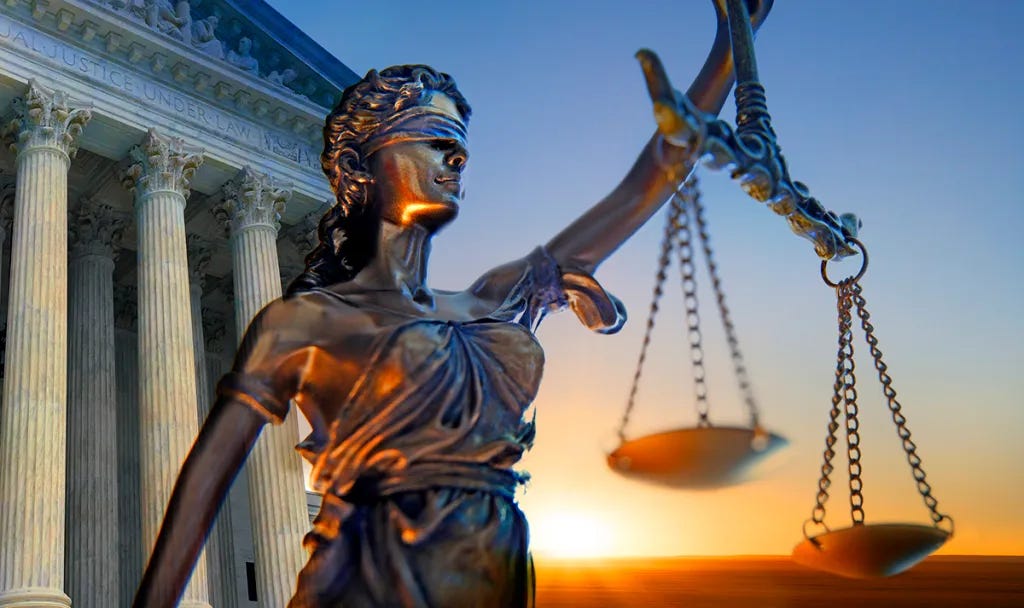Explainer: Political Prosecutions and the "Weaponization" of the DOJ
The DOJ’s dismissal of criminal charges against NYC Mayor Eric Adams has rightly been called a norms-shattering bombshell.
But even the few Americans who closely follow the news have Trump fatigue. When we use charged jargon like “weaponization” and “political prosecution,” they tune out even more.
Instead, we could try to connect through shared values and relatable experiences to explain why the situation is truly so dire.
What is the “Weaponization” of the DOJ?
The ideas of fairness and power aren’t new to anyone.
Let’s say your teacher is awarding the top grade in class based on criteria set out at the start of the term. It would be fair if the best student got the top grade based on those criteria. You wouldn’t want another student to win just because they helped the teacher with a project for a different class, and you shouldn’t want to win simply you and the teacher attend the same small church.
Now imagine what’s at stake isn’t a grade but whether you’re going to federal prison, and imagine the person in power is the President of the United States.
In America, we say justice is blind. The only thing that should determine whether you go to jail is if there’s evidence you committed a crime. Your political party should have nothing to do with it.
If you didn’t commit the crime, you shouldn’t be locked up just because you’re a political opponent of someone in power. That would be a “political prosecution.”
If you did break the law, you shouldn’t be handed a get-out-of-jail-free card just for doing a favor for the person in power.
If these lines are crossed, then our justice system is no longer blind.1 Instead, it’s a tool that people in power can use to gain even more power. It’s a weapon.
Trump Says Biden Weaponized the DOJ. Did He?
Trump says Biden weaponized the DOJ because the January 6th and classified documents cases were political prosecutions not based on evidence.
There’s no indication of that:
All court filings indicated the charges against Trump were brought on the basis of (tons of) actual evidence.
If Biden targeted Trump on a political basis, he would have filed the charges in time to hold trials before the election.
If Biden was weaponizing his DOJ, why did he bring cases against his own son and Dems like NJ Senator Bob Menendez and NYC Mayor Eric Adams?
Another essential point is deep in the weeds: Biden had a strongly-enforced-and-adhered-to policy that White House officials don’t communicate with—let alone influence or direct—DOJ officials when it comes to which criminal cases to file.
This type of policy is exactly how justice stays blind and avoids becoming a political weapon.
Trump Shattered These Norms in Just Three Weeks
The Trump DOJ hasn’t—so far—publicly announced any prosecutions or investigations on political grounds. In her confirmation hearing, AG Bondi claimed all investigations will be “based on the facts and the law that is applied in good faith.”
Time will tell, because last week the White House and DOJ agreed to drop federal criminal charges in exchange for a political favor—despite a mountain of evidence that the defendant committed crimes.
Specifically, NYC Mayor Eric Adams—who had long opposed Trump’s attempts to crack down on immigration in NYC—agreed to help Trump with his anti-immigrant efforts, but only if Trump’s DOJ dismissed the criminal charges against him.
Trump agreed, but with leverage. He agreed to dismiss the charges “with prejudice,” which is a fancy legal term meaning Trump can re-file the charges anytime.
This is the ultimate political weaponization. This turns Adams into Trump’s puppet, forcing him to keep doing favors for Trump out of fear that the federal criminal case against him could reappear at any time.
###
Adams does a favor for the man in power and doesn’t have to answer for his crimes. Trump uses our public institutions to gain political power for himself. These are not American values. Or at least they didn’t used to be.
There are, of course, deep flaws in our justice system that make it difficult to be described as “impartial.” For example, if a Black man and a White man are convicted of similar crimes, the Black man will, on average, receive a sentence that’s 13.4% longer.

